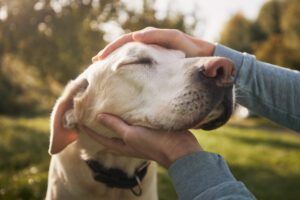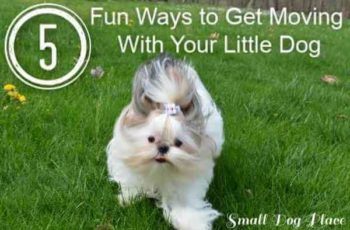
I don’t think I’ve ever had a dog whom I enjoy petting as much as I enjoy my 8-year-old Pit Bull-mix Woody. He has a firm, well-muscled body, a short, clean coat, silky ears, and the most smooshable jowls . . . if you like dogs, it’s just a pleasure to run your hands all over him.
If only he liked it as much as I do!
Sometimes, he does. At night, when the family is all snuggling on the couch, he loves to curl right up next to me and I can tell he enjoys having those thick muscles on his neck and shoulders massaged. And there are other times when he seeks out – insists on – being petted or having his butt scratched. But there are also times when he will back away from me or someone else who wants to pet him, duck out from under an outstretched hand, or, so subtly most people wouldn’t notice it, ever so slightly pull his ears down and backward when someone touches him.
Two-year-old Boone, in contrast, is a touch sponge. If you start petting him, prepare to be there for a while, because he wants more, more, MORE! He will even tolerate invasive touch between his toes or investigations of his ears, as long as you keep touching him.
People need to pay attention to their own dogs to figure out whether their dogs like being petted, or if so, when and where. I can’t tell you how frequently I see people pet (or worse, pat) their dogs when they are talking to someone, or otherwise distracted, while their dogs duck and try to wriggle away, not in the mood for petting at that time. Lots of people pet their dogs – or enthusiastically ruffle their fur – when they are trying to provide praise and reinforcement, and sometimes some dogs love that! But other times, the dog is too busy or distracted or concentrating on the tasks at hand, and is actively avoidant of the person’s intended “reward.”
When you intentionally look for clues as to whether or not a dog wants to be petted (or massaged or have his fur ruffled), you’ll see them. If a dog leans into the touch, visibly relaxes into the person’s hands, or climbs into the person’s lap, they like it. If they seem to ignore the person entirely or move away, they are saying as politely as possible, “No thanks!” And if we persist, we are, in effect, punishing them! Subjecting them to touch they do not enjoy is not only insensitive, if you think about it, it’s creepy – and may well make them avoid you in the future.
It can hurt your feelings, having your dog reject your touch. But it shouldn’t! They have a right to their honest opinion of what feels good and what does not! And if we pay attention and try to figure out what they like (and don’t like), we can increase their enjoyment of being touched, groomed, or massaged, and deepen their overall appreciation of us. And anything we can do to make them enjoy us more will improve our relationship and communication even more.


